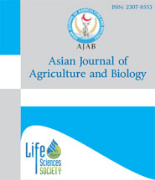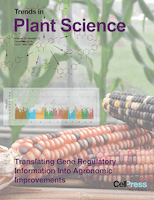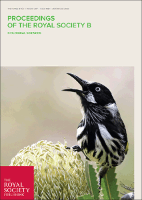
BIOLOGICAL RESEARCH
Scope & Guideline
Innovating agriculture and medicine through research.
Introduction
Aims and Scopes
- Molecular Biology and Genetics:
Research in this area includes studies on gene expression, molecular interactions, and genetic variability, providing insights into the mechanisms underlying biological functions and disease. - Ecology and Environmental Biology:
This scope covers biodiversity assessments, ecological interactions, and environmental impacts, emphasizing the importance of conservation and sustainable practices. - Phytochemistry and Pharmacology:
The journal features studies on bioactive compounds from plants, exploring their therapeutic potential and applications in medicine. - Microbiology and Pathogen Research:
Research on microbial diversity, pathogenicity, and antimicrobial resistance is a key area, highlighting the health implications of microbial interactions. - Agricultural and Plant Sciences:
This includes studies on crop improvement, pest management, and sustainable agricultural practices, aiming to enhance food security and agricultural productivity. - Biotechnology and Applied Sciences:
The journal publishes research on innovative biotechnological applications, including genetic engineering, bioremediation, and nanotechnology, demonstrating their potential in various sectors.
Trending and Emerging
- Sustainable Agriculture and Food Security:
Recent publications increasingly emphasize sustainable practices, crop resilience, and innovative agricultural technologies to address food security challenges. - Microbiome Research:
There is a growing focus on the gut microbiome and its implications for health, which aligns with broader trends in personalized medicine and nutrition. - Environmental Toxicology and Remediation:
Research on the impacts of pollutants and the development of bioremediation strategies is trending, reflecting heightened awareness of environmental health. - Bioinformatics and Computational Biology:
The integration of computational tools in biological research is on the rise, facilitating complex data analysis and modeling, especially in genomics and proteomics. - Antimicrobial Resistance and Novel Therapeutics:
As the threat of antibiotic resistance grows, there is an increasing emphasis on researching alternative therapies and understanding microbial resistance mechanisms.
Declining or Waning
- Traditional Ethnobotany Studies:
Research focusing solely on traditional uses of plants without empirical validation or modern applications appears to be waning, possibly due to a shift towards more rigorous scientific validation and application. - Basic Taxonomic Studies:
There has been a noticeable decline in papers focused on mere taxonomic classification of species, as the field moves towards integrative approaches that combine taxonomy with ecological and genetic studies. - Conventional Agricultural Practices:
Research centered on conventional farming methods is decreasing as more studies focus on sustainable practices and organic farming alternatives. - In vitro Studies with Limited Applications:
While in vitro studies remain important, those that do not translate into practical applications or insights into in vivo effects are becoming less common. - Animal Studies with Limited Relevance to Human Health:
Studies focusing on animal models that do not have clear implications for human health or translational research are appearing less frequently.
Similar Journals

Journal of Biological Research-Thessaloniki
Unveiling New Discoveries in Biochemistry and Genetics.Journal of Biological Research-Thessaloniki, published by Aristotle University of Thessaloniki, is a distinguished academic journal committed to advancing the fields of Agricultural and Biological Sciences and Biochemistry, Genetics and Molecular Biology. As an Open Access journal since 2004, it provides a platform for the rapid dissemination of innovative research that spans diverse biological disciplines. With an impact factor that situates it in the Q2 category for Agricultural and Biological Sciences and Q3 for Biochemistry, Genetics and Molecular Biology as of 2023, the journal demonstrates a significant contribution to its respective fields. Located in Thessaloniki, Greece, it serves a global audience of researchers, professionals, and students eager to access quality scientific content. The journal is dedicated to publishing original research articles, reviews, and critical commentaries, encouraging collaboration and dialogue amongst scientists dedicated to the frontiers of biological research.

Biologia Futura
Connecting Researchers for a Greener TomorrowBiologia Futura, an esteemed journal published by SPRINGER HEIDELBERG, serves as a vital platform for researchers and professionals in the fields of Agricultural and Biological Sciences, as well as Biochemistry, Genetics, and Molecular Biology. Established in Hungary, this journal has been at the forefront of scientific inquiry since its inception in 2019 and continues to contribute significantly to advancing knowledge through rigorous peer-reviewed articles. With current rankings placing it in the second quartile for Agricultural and Biological Sciences and third quartile for Biochemistry, Genetics, and Molecular Biology according to Scopus metrics, it reflects a robust academic quality and reach. Scholars are encouraged to share their original research, reviews, and innovations that intersect these dynamic fields. Although not an open access publication, Biologia Futura ensures wide dissemination of high-impact research from its notable address at Tiergartenstraße 17, D-69121 Heidelberg, Germany, aiming to foster collaboration and discovery within the global scientific community.

JOURNAL OF BIOSCIENCES
Championing Impactful Discoveries in Life SciencesJOURNAL OF BIOSCIENCES, published by the Indian Academy of Sciences, has established itself as a pioneering platform in the fields of biosciences, encompassing diverse research areas such as agricultural and biological sciences, biochemistry, genetics, molecular biology, and medicine. With an impressive trajectory since its inception in 1979, the journal has achieved notable recognition, securing a Q1 ranking in Agricultural and Biological Sciences and maintaining its place in the top quartiles for Biochemistry and Medicine as of 2023. With Scopus rankings placing it at #32 in General Agricultural and Biological Sciences and #65 in General Biochemistry, Genetics, and Molecular Biology, the journal reaches the 85th and 70th percentiles respectively, reflecting its impact and relevance in current scientific discourse. Although it does not offer open access, the JOURNAL OF BIOSCIENCES remains crucial for researchers, professionals, and students dedicated to advancing knowledge and innovation within the biosciences, providing a vibrant forum for high-quality research and comprehensive reviews.

Vestnik Tomskogo Gosudarstvennogo Universiteta-Biologiya
Innovating in Agriculture and Environmental Science for TomorrowVestnik Tomskogo Gosudarstvennogo Universiteta-Biologiya is a prominent peer-reviewed journal dedicated to advancing knowledge in the fields of Agricultural and Biological Sciences, Biochemistry, and Environmental Science, published by TOMSKIJ GOSUDARSTVENNYI UNIV in the Russian Federation. With an ISSN of 1998-8591 and an E-ISSN of 2311-2077, this journal serves as a vital platform for researchers to disseminate findings that encompass diverse biological disciplines. Although currently categorized in the fourth quartile across several fields, including Agricultural and Biological Sciences (Q4) and Environmental Science (Q4), the journal is committed to improving its academic impact and visibility. Its publication spectrum includes significant contributions from both local and international scholars, fostering a rich exchange of ideas and research methodologies. Access to the journal’s content is unrestricted, providing valuable resources for students, professionals, and researchers alike. As the journal converges its focus from 2018 to 2024, it aims to enhance its academic stature while contributing rigorously to contemporary biological research.

TURKISH JOURNAL OF BIOLOGY
Pioneering Research in Cell Biology, Genetics, and MicrobiologyTURKISH JOURNAL OF BIOLOGY, published by the Tubitak Scientific & Technological Research Council Turkey, is an esteemed peer-reviewed periodical that serves as a pivotal platform for advancing the fields of Agricultural and Biological Sciences. With a strong focus on innovative research across various biological domains, including Cell Biology, Genetics, and Microbiology, this journal not only fulfills the academic community's quest for high-quality research but also fosters collaboration and knowledge sharing among researchers. The journal's notable impact factors reflect its commitment to excellence, with its latest rankings placing it in Q2 in Agricultural and Biological Sciences (miscellaneous) and in Q4 for several other categories. By offering open access to its content, TURKISH JOURNAL OF BIOLOGY ensures that valuable biological insights are readily available to the global academic community. Its convergence from 2006 to 2024 signifies its longstanding influence in the biosciences, making it an essential resource for researchers, professionals, and students alike aiming to stay at the forefront of biological research and innovation.

Tropical Life Sciences Research
Empowering Knowledge in Tropical Ecosystems and MedicineTropical Life Sciences Research, published by PENERBIT UNIVERSITI SAINS MALAYSIA, is an esteemed open-access journal dedicated to the realms of Agricultural and Biological Sciences, Biochemistry, Genetics, and Molecular Biology, and Medicine. Since its inception in 2006, this journal has established itself as a significant platform for disseminating high-quality research findings that contribute to the understanding of tropical biodiversity and health-related issues. With its innovative approach, Tropical Life Sciences Research has garnered an impressive impact factor, reflecting its influence in the academic community; it is ranked Q2 in Agricultural and Biological Sciences and Q3 in both Biochemistry and Medicine categories as of 2023. Researchers and professionals can access a wealth of knowledge through this journal, whose content spans from 2009 to 2024, making it a vital resource for students and experts alike interested in advancing the science of tropical ecosystems and health. The journal also stands out for its comprehensive Scopus rankings, indicating its relevance and quality in the competitive academic landscape.

Asian Journal of Agriculture and Biology
Fostering knowledge in agriculture and biology for a better tomorrow.Welcome to the Asian Journal of Agriculture and Biology, a premier open access journal published by LIFE SCIENCES SOC PAKISTAN, dedicated to advancing research in the fields of agricultural and biological sciences. Since its inception in 2013, this journal has provided a vital platform for scholars and practitioners to disseminate novel findings and innovative methodologies that contribute to the betterment of agricultural practices and biological research. With an impressive H-Index and ranked in the Q3 category across multiple disciplines including Agricultural and Biological Sciences, Biochemistry, Genetics, and Molecular Biology, as well as Medicine, the journal showcases high-quality research that influences both academic and practical applications globally. The journal is indexed in Scopus, reinforcing its commitment to high academic standards and providing researchers with efficient access to significant knowledge. Based in Pakistan, the Asian Journal of Agriculture and Biology is your gateway to staying abreast of the latest trends and discoveries that support sustainable development and health sciences.

TRENDS IN PLANT SCIENCE
Connecting Ideas, Cultivating KnowledgeTRENDS IN PLANT SCIENCE is a premier academic journal published by CELL PRESS, dedicated to advancing the field of plant sciences. With an ISSN of 1360-1385 and E-ISSN 1878-4372, this journal has established itself as a critical resource for researchers and practitioners alike, boasting a remarkable impact factor that places it in the Q1 quartile for plant science in the 2023 rankings. Featuring a comprehensive scope that encompasses emerging trends, innovative research, and pivotal reviews in the plant sciences, it aims to promote interdisciplinary dialogue and encourage progressive research methodologies. Hailing from the United Kingdom, TRENDS IN PLANT SCIENCE serves a global community of over 516 journals, achieving a top-tier ranking of 3rd in the Scopus ranking for Agricultural and Biological Sciences. This makes the journal an indispensable asset for anyone aiming to keep abreast of the latest developments in plant biology and its applications. As we look towards its future converging years from 1996 to 2024, the journal continues to foster scholarly excellence and innovation in the field.

BMC BIOLOGY
Empowering Research Through Open Access Innovation.BMC Biology, a prominent open access journal published by BMC since 2003, offers a dynamic platform for the dissemination of research in the fields of biology, biochemistry, and biotechnology. Based in the United Kingdom, this journal showcases high-impact studies that cover a broad range of topics including cell biology, developmental biology, ecology, and structural biology, reflecting its commitment to advancing knowledge in the life sciences. With an impressive record of Q1 rankings across multiple categories in 2023, including Agricultural and Biological Sciences and Biochemistry, Genetics and Molecular Biology, BMC Biology stands out as a leader in these disciplines. Researchers will find a robust forum for innovative and high-quality research due to its substantial Scopus rankings, which place it within the top 10% of its field. The journal's open access policy facilitates widespread dissemination, ensuring that critical biological research is accessible to a diverse global audience. Whether you are a researcher, student, or professional in the biological sciences, BMC Biology is essential for staying informed about the latest advancements and developments in this ever-evolving field.

PROCEEDINGS OF THE ROYAL SOCIETY B-BIOLOGICAL SCIENCES
Pioneering Research for a Sustainable FuturePROCEEDINGS OF THE ROYAL SOCIETY B-BIOLOGICAL SCIENCES, published by the esteemed Royal Society, stands as a premier platform for disseminating cutting-edge research in the fields of Biological Sciences. With an impressive impact factor reflective of its high citation rates and scholarly contributions, this journal encompasses a wide array of disciplines, including Agricultural and Biological Sciences, Biochemistry, Genetics and Molecular Biology, Environmental Science, and Immunology and Microbiology, consistently ranking in the Q1 category across these fields. Since its inception in 1946, it has been committed to advancing our understanding of biological systems and informing evidence-based practices. Researchers and academics can submit their work without the Open Access barrier, thereby maintaining the integrity of the disciplinary discourse while providing comprehensive insights. The journal's location in the United Kingdom also positions it at the heart of global scientific innovation, making it a vital resource for professionals and students alike who are eager to explore the latest trends and breakthroughs in the biological sciences.